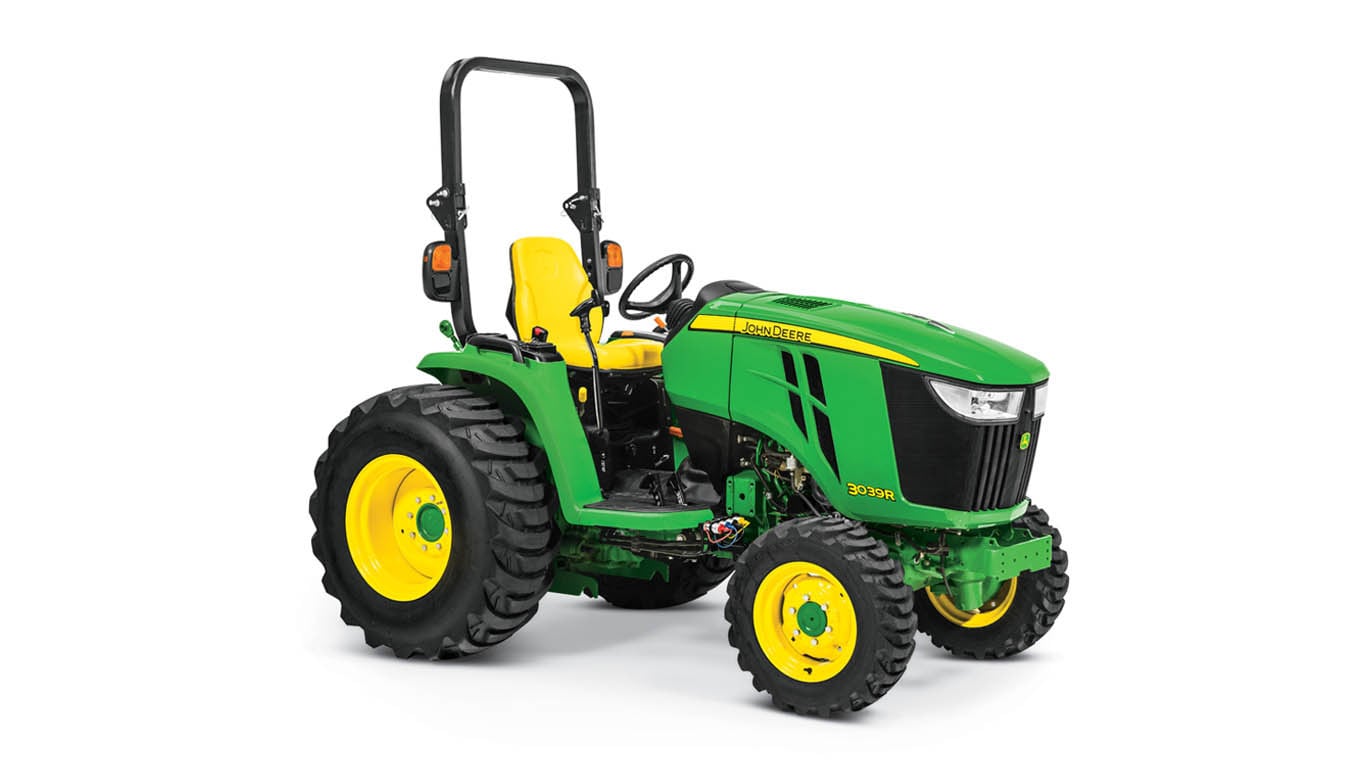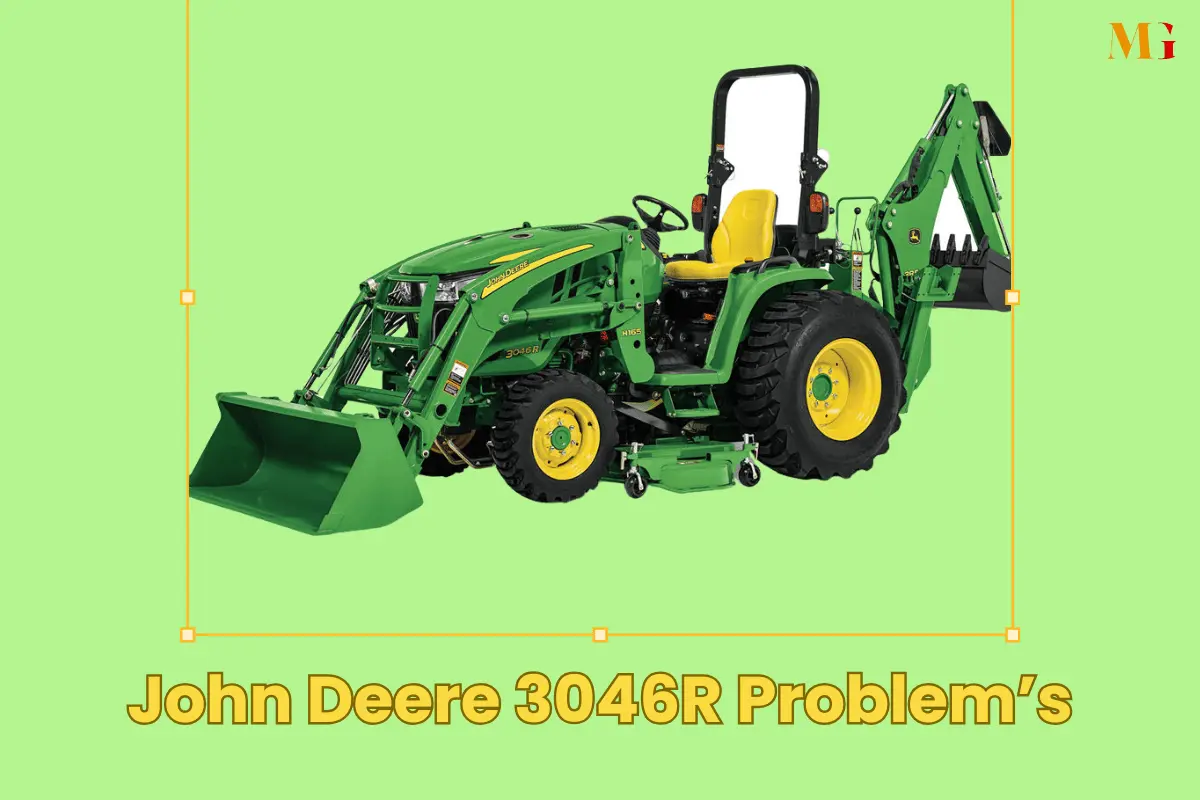The John Deere 3046R is a popular compact tractor. But like any machine, it has its issues.
In this blog post, we will explore common problems owners face with the John Deere 3046R. Whether you’re a current owner or considering a purchase, understanding these issues can save you time and frustration. From engine troubles to hydraulic system glitches, knowing what to watch for helps in maintaining your tractor’s performance.
This guide aims to provide insights and solutions, ensuring your John Deere 3046R runs smoothly. Stay informed, and keep your equipment in top shape. Let’s dive into the specifics of these common problems and how to address them effectively.
Engine Troubles
Owning a John Deere 3046R can feel like a dream come true for many farmers and landowners. It’s a sturdy, reliable piece of machinery that can handle a variety of tasks. However, like any piece of equipment, it is not without its quirks. One of the most common areas where users experience issues is with the engine. In this section, we’ll dive into two frequent engine problems: starting issues and overheating.
Starting Issues
Nothing is more frustrating than a tractor that won’t start, especially when you have a long day of work ahead of you. Starting issues with the John Deere 3046R can stem from several sources. The most common culprits include:
- Battery Problems: Sometimes, the battery may be dead or not holding a charge. Checking the battery connections for corrosion and ensuring they are tight can often resolve this issue.
- Fuel System Issues: If the fuel filter is clogged or there’s air in the fuel lines, the engine might struggle to start. Regular maintenance of the fuel system is key.
- Ignition Switch: A faulty ignition switch can also be a reason why your tractor won’t start. Replacing the switch might be necessary.
I’ve been there, trying to start my 3046R early in the morning, only to be met with silence. After some troubleshooting, I found a loose battery connection was the culprit. A quick fix, but one that saved a lot of headaches!
Overheating
Overheating is another common issue that can bring your farming activities to a grinding halt. The John Deere 3046R is designed to operate under tough conditions, but when it overheats, it can signal a more serious problem. Let’s look at some typical reasons for overheating:
- Coolant Levels: Low coolant levels can cause the engine to overheat. Regularly check and top up the coolant to avoid this problem.
- Radiator Issues: A clogged radiator can impede the cooling process. Cleaning the radiator and ensuring it is free from debris can help maintain proper engine temperature.
- Thermostat Problems: A faulty thermostat can prevent coolant from flowing through the engine properly. Replacing a malfunctioning thermostat can resolve overheating issues.
One summer, my 3046R started overheating after just a few hours of use. After a bit of detective work, I discovered the radiator was clogged with dirt and debris. A thorough cleaning did the trick, and my trusty tractor was back to its old self.
In conclusion, while the John Deere 3046R is a robust and dependable machine, being aware of potential engine troubles can save you time and frustration. Regular maintenance and prompt attention to issues can keep your tractor running smoothly.
Hydraulic System Failures
The John Deere 3046R is a robust and reliable tractor. Yet, it can face hydraulic system failures. This section will explore common issues such as slow response and leaks.
Slow Response
One major issue with the John Deere 3046R is slow hydraulic response. This can make the tractor hard to operate. Slow response usually happens due to a clogged filter. Or it might be caused by low hydraulic fluid levels. Regular maintenance can prevent this problem. Always check the fluid levels and filters.
Leaks
Hydraulic leaks are another frequent problem. Leaks can reduce efficiency and cause safety risks. They often occur at the hoses or seals. Inspect these parts regularly to spot any wear or damage. Replacing worn-out parts can fix the leaks. Use quality hydraulic fluid to prevent future leaks.
Transmission Problems
When it comes to your John Deere 3046R tractor, transmission problems can be a real headache. Whether you’re a seasoned farmer or just starting out, understanding these issues can save you time and money. In this section, we’ll discuss the most common transmission problems: gear slippage and unusual noises. Let’s dive in!
Gear Slippage
Have you ever experienced your tractor slipping out of gear unexpectedly? It’s not just annoying; it can be dangerous. Gear slippage in the John Deere 3046R is a common problem and can be caused by several factors:
- Worn-out gears: Over time, the gears wear down and lose their grip, causing them to slip.
- Improper lubrication: Lack of proper lubrication can lead to increased friction and wear, causing slippage.
- Clutch issues: A malfunctioning clutch can fail to engage the gears properly.
To diagnose gear slippage, pay attention to when it happens. Is it during specific activities or at certain speeds? Keeping a log can help your mechanic pinpoint the issue faster. Trust me, I learned this the hard way when my tractor started acting up right in the middle of plowing season!
Unusual Noises
If your John Deere 3046R is making strange noises, it’s trying to tell you something. Unusual noises often indicate that something is wrong with the transmission. Here are some common culprits:
- Grinding sounds: This usually means the gears are not meshing correctly.
- Whining noises: This can be a sign of low transmission fluid or a failing pump.
- Clunking noises: Often caused by loose or damaged parts within the transmission.
Ever been out in the field and heard a noise that made you stop and say, “What was that?” I have, and let me tell you, ignoring it is never a good idea. Regular maintenance checks can help you catch these issues before they become major problems. Think of it like a check-up for your tractor—better safe than sorry!
In conclusion, addressing transmission problems early on can save you from costly repairs and downtime. Keep an ear out for unusual noises and be mindful of gear slippage. Regular maintenance is key to keeping your John Deere 3046R running smoothly. Happy farming!
Credit: heritagetractor.com
Electrical System Malfunctions
The John Deere 3046R is a powerful and reliable tractor. Yet, it can face electrical system malfunctions. These issues can disrupt your work and lead to costly repairs. Understanding these common problems can help you tackle them quickly and efficiently.
Battery Drain
One of the frequent issues is battery drain. The battery may lose charge faster than expected. This can leave you stranded in the middle of a task. Causes include faulty wiring or a malfunctioning alternator. Regular checks can help identify and fix these issues early.
Faulty Sensors
Faulty sensors are another common problem. Sensors monitor various systems in the tractor. If a sensor fails, it can send incorrect data. This can lead to poor performance or complete system failure. Regular maintenance and sensor checks are crucial. Replacing a faulty sensor can prevent larger issues down the road.
Steering Difficulties
When it comes to the John Deere 3046R tractor, steering difficulties can be a real headache for users. Whether you’re an experienced operator or someone new to using this piece of machinery, understanding the common steering issues and how to address them is crucial. In this section, we’ll delve into two major steering problems: stiff steering and loose steering. Let’s get started!
Stiff Steering
Have you ever felt like you’re wrestling with your John Deere 3046R just to make a turn? You’re not alone. Stiff steering can make maneuvering your tractor feel like a gym workout. This issue often arises due to a lack of proper lubrication or damage to the steering components.
Here are a few common causes and solutions:
- Low Hydraulic Fluid: Ensure the hydraulic fluid is at the correct level. Low fluid can cause stiff steering.
- Dirty Filters: Replace or clean the hydraulic filters regularly to ensure smooth operation.
- Steering Cylinder Issues: Inspect the steering cylinder for any leaks or damage. If damaged, it may need replacement.
Regular maintenance checks can help you avoid these issues. Trust me, your arms will thank you!
Loose Steering
On the flip side, loose steering can be just as problematic. Imagine trying to navigate your tractor and feeling like the steering wheel has a mind of its own. Not fun, right? Loose steering can make it difficult to control your tractor, leading to safety concerns.
Common causes of loose steering include:
- Worn Steering Linkage: Over time, the steering linkage can wear out, causing play in the steering wheel. Check and replace any worn parts.
- Loose Bolts and Nuts: Ensure all bolts and nuts in the steering system are properly tightened. Loose connections can cause steering to feel wobbly.
- Faulty Steering Gear: The steering gear may need adjustment or replacement if it’s not functioning correctly.
Addressing these issues promptly can save you from unexpected breakdowns. Plus, who wants to be stranded in the middle of a field? Not me!
In conclusion, keeping an eye on your John Deere 3046R’s steering system is essential for smooth and safe operation. Regular maintenance and timely repairs can keep your tractor running like a dream.

Brake Issues
Let’s face it, brake problems can be downright scary. Imagine you’re in the middle of a crucial job with your John Deere 3046R, and the brakes start acting up. Not fun, right? Today, we’ll dive into common brake issues you might face with this model, and how to handle them. Buckle up!
Poor Braking
Poor braking can be a real downer, especially when you need to stop quickly. Here’s what you might experience and how to troubleshoot:
- Symptoms: The tractor takes longer to stop, or you feel like you need to press the brake pedal harder than usual.
- Possible Causes: Worn brake pads, low brake fluid, or air in the brake lines.
For instance, I remember a time when I was mowing a steep slope, and my 3046R’s brakes felt mushy. I quickly checked the brake fluid and, lo and behold, it was low. A quick top-up, and I was back in business!
Brake Pedal Sinking
If your brake pedal sinks slowly to the floor when pressed, that’s a red flag. Here’s what could be going on:
- Symptoms: The brake pedal gradually moves down to the floor without consistent resistance.
- Possible Causes: Leaking brake fluid, a faulty master cylinder, or internal brake line damage.
Imagine pressing the brake pedal and it feels like stepping on a sponge. Not ideal, right? This can be particularly nerve-wracking if you’re hauling a heavy load. Checking for leaks around the brake lines or master cylinder is a good first step. If you spot a puddle of brake fluid, it’s time to get those leaks fixed ASAP.
Brake issues may seem intimidating, but with a bit of knowledge and timely intervention, you can keep your John Deere 3046R running smoothly and safely. Keep an eye out for these symptoms, and address them promptly. After all, a well-maintained tractor is a happy tractor!
Pto (power Take-off) Failures
Owning a John Deere 3046R can be a dream come true, but it’s not always smooth sailing. One common issue is with the PTO, or Power Take-Off. This system is vital for running implements like mowers and tillers. When it fails, it can bring your work to a grinding halt. Let’s dive into some of the specific PTO problems you might face.
Engagement Problems
One frequent complaint among John Deere 3046R owners is that the PTO won’t engage properly. Imagine trying to mow your field, and the mower simply won’t start. Frustrating, right? This issue is often due to worn-out or misaligned PTO clutch components.
- Worn Clutch: Over time, the clutch can wear out. Replacing it can resolve the issue.
- Misalignment: Sometimes, the clutch parts can become misaligned. Checking and realigning them can help.
Regular maintenance checks are a good practice to avoid these problems. This way, you can spot issues before they become major headaches.
Loss Of Power
Another common issue is the loss of power in the PTO. You might notice that the attachments are not running at full speed or power. This can make tasks like tilling or mowing take much longer than usual.
- Hydraulic Issues: The hydraulic fluid levels might be low, or the fluid might be old. Always check and replace hydraulic fluid as needed.
- Filter Blockage: A blocked filter can restrict fluid flow. Cleaning or replacing the filter can restore power.
Keeping an eye on hydraulic fluid and filters can save you a lot of trouble. Think of it as giving your tractor a little TLC.
To wrap up, while the John Deere 3046R is a reliable machine, its PTO system can sometimes act up. Knowing how to troubleshoot these issues can keep your tractor running smoothly. After all, a well-maintained tractor is a happy tractor.
Credit: www.greentractortalk.com
Preventative Maintenance
When it comes to keeping your John Deere 3046R running smoothly, preventative maintenance is key. Just like you wouldn’t skip a doctor’s appointment, your tractor deserves regular check-ups too. Preventative maintenance helps you avoid unexpected breakdowns and keeps your machine in top shape. Let’s dive into some essential practices to keep your John Deere 3046R running like a charm.
Regular Inspections
Think of regular inspections as your tractor’s wellness check. These are simple tasks you can perform on your own to catch minor issues before they become major headaches. Here are a few things you should regularly inspect:
- Oil Levels: Always check the oil levels before starting your tractor. Low oil can cause serious damage to the engine.
- Tires: Look for any cuts, punctures, or excessive wear. Properly inflated tires ensure better traction and fuel efficiency.
- Hydraulic System: Check for leaks or unusual noises. A well-maintained hydraulic system ensures smooth operation of attachments.
- Belts and Hoses: Inspect for cracks, fraying, or loose connections. Replacing worn belts and hoses can prevent breakdowns.
By taking a few minutes to perform these checks, you can save yourself a lot of trouble down the road. Remember, an ounce of prevention is worth a pound of cure!
Scheduled Servicing
While regular inspections are great, some maintenance tasks require a professional touch. That’s where scheduled servicing comes in. Just like your car needs regular servicing, so does your tractor. Here are some key services to keep in mind:
- Oil Changes: Follow the manufacturer’s guidelines for oil change intervals. Fresh oil keeps your engine running smoothly.
- Filter Replacements: Air, fuel, and oil filters need regular changing. Clean filters ensure optimal performance.
- Coolant System: Flush and replace the coolant as recommended. This prevents overheating and protects the engine.
- Transmission Service: Regularly check and replace transmission fluid. This ensures smooth shifting and prolongs the life of your transmission.
Scheduled servicing might seem like a hassle, but it’s a crucial part of maintaining your John Deere 3046R. Plus, it gives you peace of mind knowing that your tractor is in good hands.
In conclusion, taking care of your John Deere 3046R with regular inspections and scheduled servicing can save you time, money, and stress. It’s all about being proactive and catching potential problems before they become serious. So, next time you’re tempted to skip that maintenance check, remember: your tractor will thank you for it!
Frequently Asked Questions
Which John Deere Tractors Are Being Recalled?
John Deere recalls include models 1023E, 1025R, and 2025R compact utility tractors. These models may have faulty transmission components.
What Is Considered High Hours On A John Deere Tractor?
High hours on a John Deere tractor typically mean over 5,000 hours. Proper maintenance can extend its lifespan.
What Horsepower Is A John Deere 3046r?
The John Deere 3046R has a horsepower of 45. This compact utility tractor offers reliable performance for various tasks.
What Is The Life Expectancy Of A John Deere Riding Mower?
A John Deere riding mower typically lasts 10 to 15 years with proper maintenance. Regular servicing extends its lifespan.
What Are Common Issues With John Deere 3046r?
John Deere 3046R often faces transmission problems, engine overheating, and electrical issues. Regular maintenance can help.
How To Fix John Deere 3046r Transmission Problems?
Check the transmission fluid level first. If it’s low, refill. Also, inspect for any leaks or worn-out parts.
Conclusion
The John Deere 3046R has its issues, but remains a strong tractor. Regular maintenance helps avoid many problems. Always check parts and consult the manual. Keep an eye on performance. Address issues early to extend its life. A well-maintained 3046R serves you well on the farm.
For consistent results, stay proactive with care. Happy farming!

